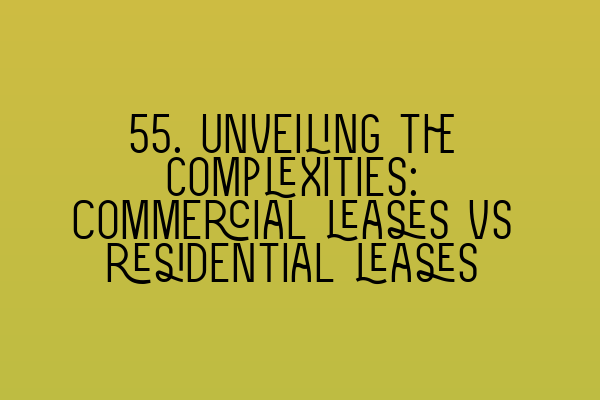55. Unveiling the complexities: Commercial leases vs residential leases
As a solicitor specializing in property law, it is crucial to understand the intricacies and differences between commercial leases and residential leases. These two types of leases have distinct legal frameworks and considerations. Whether you are a landlord, tenant, or legal professional, familiarizing yourself with these complexities is key to navigating the property market successfully.
In this blog post, we will delve into the differences between commercial leases and residential leases and outline the key considerations for both landlords and tenants. Let’s explore the unique aspects of each type of lease:
1. Purpose and Use:
Commercial leases are primarily used for business purposes. They are commonly seen in commercial properties such as office buildings, retail spaces, and industrial units. On the other hand, residential leases are used for housing purposes, allowing individuals or families to occupy a property as their home.
Commercial leases typically have longer durations, often spanning multiple years, with a greater focus on negotiation and customization to cater to the specific needs of businesses. Residential leases, on the other hand, are often shorter-term and have more standardized terms to provide stability for tenants.
2. Legal Protection:
Both commercial and residential leases offer legal protections, but the extent of these protections can vary. Residential leases are subject to extensive statutory regulations designed to protect tenants’ rights, including regulations related to rent increases, eviction procedures, and the landlord’s obligations for repairs and maintenance.
Commercial leases usually offer less statutory protection due to the assumption that businesses have greater negotiating power and rely more on market forces to determine terms. This places a higher emphasis on the covenant between landlord and tenant, with more leeway for negotiation and customization.
3. Lease Terms and Rent:
Lease terms for commercial properties are typically more complex and detailed compared to residential leases. Commercial leases often include provisions related to rent reviews, break clauses, repair obligations, service charges, and user clauses. These provisions can significantly impact the financial obligations and flexibility of both parties.
Residential leases tend to have more standardized terms, and the rent is often determined by market forces and local regulations. However, there may be provisions related to rent increases, changes in tenancy, and termination procedures that need to be considered.
4. Repairs and Maintenance:
The responsibility for repairs and maintenance can differ between commercial and residential leases. Commercial leases often place a greater burden on the tenant to maintain and repair the property, including structural repairs and the upkeep of fixtures and fittings. In contrast, residential leases typically place more responsibility on the landlord to ensure that the property is in a habitable condition and comply with health and safety standards.
5. Security of Tenure:
Residential tenants usually have greater security of tenure compared to commercial tenants. Residential leases often provide tenants with the right to renew the lease and protection against eviction without specific grounds.
In contrast, commercial leases may have more limited protection, and landlords have more flexibility in terminating the lease at the end of the term or during the term for specific breach of covenant.
6. Complexities and Expertise:
Due to the greater complexity and customization potential of commercial leases, understanding their intricacies often requires legal expertise. Legal professionals specializing in property law will assist in drafting and negotiating commercial leases to ensure clarity, fairness, and protection for both parties.
In contrast, residential leases are relatively more straightforward, and tenants often rely on standard forms provided by local housing authorities or rental agencies. However, seeking legal advice is still beneficial to ensure compliance with local regulations and protect tenants’ rights.
In conclusion, commercial leases and residential leases have distinct legal frameworks and considerations. Understanding the differences between these types of leases is paramount for landlords, tenants, and legal professionals involved in property transactions. While commercial leases are typically more complex and customizable, residential leases offer more statutory protections for tenants.
If you require legal assistance or advice regarding commercial or residential leases, SQE Property Law & Land Law specializes in property law matters and can guide you through the complexities of lease agreements. Contact us today for expert legal support.
Related Articles:
– SQE 1 Practice Exam Questions
– SQE 1 Practice Mocks FLK1 FLK2
– SQE 2 Preparation Courses
– SQE 1 Preparation Courses
– SRA SQE Exam Dates
